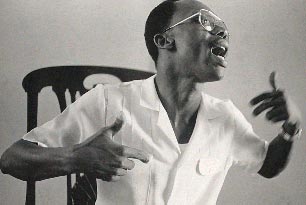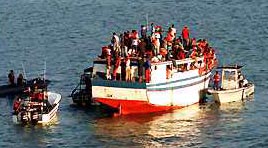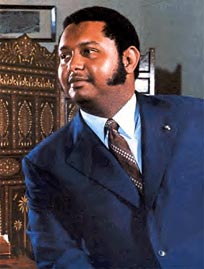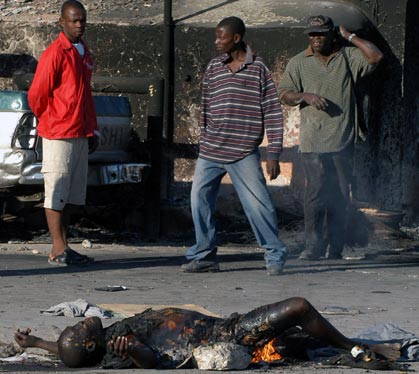U.S.-Sponsored Regime Change

|
|
 |

| |
Jean-Bertrand Aristide, in exile during the 1991-94 military junta
|
|
In
the wee hours of March 1, Marines landed in Haiti hours after President Jean-Bertrand Aristide reportedly succumbed to demands from an armed opposition movement that he step down and go into exile -- although persistent rumors on the ground maintain he was actually arrested by U.S. forces. As rebel troops entered the capitol Port-au-Prince, the UN Security Council approved a resolution authorizing a multinational force to restore order, and French troops are also on the way.
The rebel army, cobbled together from anti-government gangs and militias and led by former army officers, has achieved its aim of Aristide's ouster. It seems the cost will be the loss of Haiti's sovereignty to foreign occupation troops -- yet again.
This overthrow had been in the making since December 1990, when Haiti's first free election was held. The winning candidate, with two-thirds majority, was the populist priest Aristide, backed by a vigorous grassroots movement known as Lavalas. But seven months later, Aristide's government was overthrown in a military coup. No government on earth recognized the military junta, but as Noam Chomsky noted: "Washington maintained close intelligence and military ties with the new rulers while undermining the embargo called by the Organization of American States, even authorizing illegal shipments of oil to the regime and its wealthy supporters."
In July 1993, Aristide was made to sign the Governor's Island Accord, a U.S.-backed "peace accord" with the illegal military junta that terrorized Haiti for three years. The Accord forbade Aristide from running for re-election once he was restored to power, and gave amnesty to the death-squad terrorists of the junta. The junta then refused to abide by the accord, prompting President Clinton to send in troops in September 1994.
Aristide finished his term, although conditions imposed on him as the cost of returning to power -- such as an IMF-style "free market" reform of the economy -- eroded his popularity. But Aristide continued to stand up to the IMF and international creditors, demanding a better deal that would not impose yet harsher austerity on Haiti, the poorest country in the western hemisphere.
In 1995 Rene Preval, a close friend of Aristide, was elected as president. His government faced serious political deadlock, and in 1999 Preval declared that Parliament's term had expired and began ruling by decree.
The last elections took place in November 2000. Aristide won his second non-consecutive term -- amid allegations of irregularities by the U.S. and the opposition. Marc Bazin, a former World Bank official backed by the White House, won only 14 percent of the votes. To the dismay of Washington, Aristide was president again.
The U.S. and international donors blocked financial aid, alleging the elections were "flawed." Aristide, in need of funds to implement his social plans for the country, was immobilized. Only in July 2003, the Inter-American Development Bank resumed loan programs.
At the same time, the arming and funding of Aristide's opposition -- including the same paramilitary leaders who were at the forefront of the campaign of terror during the 1991-94 military junta -- continued. Ira Kurzban, general counsel to the Haitian government, told Pacifica Radio's Democracy Now Feb. 25 that the U.S. government was directly involved in a new military coup attempt against Aristide -- and that the rebels fighting to overthrow his government are being backed by Washington. "This is a military operation," he said, "it's not a rag-tag group of liberators, as has often been put in the press." Kurzban denied media reports that the armed groups were using weapons originally distributed by Aristide. Among the weapons used by the paramilitaries are M-16s with armor-piercing ammo and rocket-propelled grenade launchers, he said.
France was the first to call for Aristide's resignation as the rebels seized the northern half of the country in late February. The French hold grudges against Aristide for his demand last April that France pay back the $22 billion (adjusted for inflation and interest) that Haiti had to pay in 1863 for French recognition of the republic, which became independent in 1804 -- the second in the hemisphere after the U.S. in 1776, and the first independent black republic in the world. Ironically, the new uprising came weeks after Haiti had celebrated the bicentennial of its independence.

| |
In 1992, over 70,000 Haitians were intercepted as they headed towards the U.S. and created an election year problem for George H.W. Bush
|
In
a Feb. 12 letter to Secretary of State Colin Powell, Rep. Barbara Lee (D - California) wrote: "Our failure to support the democratic process and help restore order looks like a covert effort to overthrow a government. There is a violent coup d'etat in the making, and it appears that the United States is aiding and abetting the attempt to violently topple the Aristide Government. With all due respect, this looks like 'regime change.' How can we call for democracy in Iraq and not say very clearly that we support democratic elections as the only option in Haiti?"
And Rep Maxine Waters (D - California), also in a letter to Powell, said she was "outraged" at the State Department willingness to sabotage democracy and the rule of law in Haiti. "It has been clear to me for some time that the state department has been trying to undermine President Aristide... I am convinced that this effort to force President Aristide out of office by any means is a power-grab by the same forces that staged a coup d'etat and forced him out of office in 1991. The opposition that claims to be peaceful is not peaceful and they are responsible for the violence in Gonaives and other parts of Haiti. Should these actions by Andre Apaid and his Committee of 184, thugs and violent protestors receive support or encouragement from the United States, thereby increasing the risk of a coup d'etat, there may well be a bloodbath on the streets of Haiti." She called the State Department to "discontinue" its actions in support of "violent protesters and thugs" in Haiti.
The New York Times reported Feb. 12 that U.S. officials "hint[ed]" the Bush administration might support replacing Aristide -- although he had two years left in office and was elected democratically.
The
Haitian political opposition -- allied with the armed rebels -- was led by Andre "Andy" Apaid, also head of Alpha Industries, one of the oldest and largest assembly factories in Haiti. As New York's Haiti Progress reported in November, Apaid's father was a close friend to dictator Jean-Claude "Baby Doc" Duvalier. Apaid was born in New York and claims to be a Haitian citizen, although Haitian law does not allow dual-nationality and he has not renounced his U.S. citizenship. In a recent interview broadcast by the BBC Caribbean Service, Apaid voiced support for rioters in Gonaives who had torched government buildings. He is also known for pulling a gun on demonstrators organized by the Batay Ouvriye trade union who tried to picket in front of his plant. Apaid lead the opposition's "Group of 184," a supposedly broad front of "civil society" organizations modeled on similar anti-government coalitions in Chavez's Venezuela and Allende's Chile.

| |
Jean-Claude "Baby Doc" Duvalier
|
Reuters reported Feb. 21 that the armed rebel leadership includes Louis Jodel Chamblain, a prominent death-squad leader from the country's 30-year Duvalier dictatorship. In 1993, Chamblain joined with Emmanuel "Toto" Constant -- now exiled in New York -- to form the Front for the Advancement of Progress of the Haitian People, (FRAPH), which terrorized Haiti following the first coup against Aristide. He recently crossed back into Haiti from exile in the Dominican Republic to lead paramilitary units. Several other exiled figures of the junta that deposed Aristide in 1991 are also among the rebel leadership.
Kevin Pina of Berkeley's KPFA Radio, writing for the on-line Black Commentator last April, noted that Otto Reich, President Bush's envoy for Western Hemisphere Initiatives, had arrived in Haiti the same week bombs began falling on Iraq. Reich came as part of a delegation representing the Organization of American States and the Caribbean Community Council with a stated mission of brokering an agreement between the Haitian government and the opposition. His visit coincided with reports from the Haitian police that uniformed soldiers of Haiti's abolished army had begun regular armed incursions into the Central Plateau region of the country from the Dominican Republic.
Otto Reich is a veteran of another U.S.-sponsored armed insurgency against a popular government in a small, impoverished Latin American nation. Reich was the director of the State Department's Office of Public Diplomacy (OPD) for Latin America and the Caribbean from 1983 to 1986 -- at the height of the Reagan administration's covert wars in Central America. In 1987, he was accused by the Congressional probe into the "Contragate" scandal of engaging in "prohibited, covert propaganda activities" in his efforts to promote the Reagan administration's "contra" guerilla army in Nicaragua. He is today a top ideological and strategic mastermind of the counter-insurgency war in Colombia, and has been named as a behind-the-scenes figure in the failed April 2002 coup against President Hugo Chavez in Venezuela.
Haitian
police -- a force of fewer than 5,000 in a country of 8 million -- were outnumbered and outgunned in many areas by the rebel forces, and the traditionally conservative army had been abolished by Aristide following his return to power in 1994. In mid-February, as rebels seized Cap-Haitien, the second-largest city, and numerous other town across the country, police stations and government offices were looted and burned.
At least 70 people had been killed in three weeks of internal war as February drew to a close, about 40 of them police officers. "Should those killers come to Port-au-Prince, you may have thousands of people who may be killed," Aristide told the AP. "We need the presence of the international community as soon as possible."
Late on Feb. 29, as government loyalists and opponents of the paramilitary gangs were preparing resistance in Port-au-Prince, the international press reported that Aristide had fled by plane to the Central African Republic, announcing that he would seek asylum in South Africa.
Guy Philippe, a former police chief who has emerged as public voice of the armed rebellion, told CNN he would welcome foreign troops. Philippe, who fled into exile in 2000 after being charged in a coup plot, insists he has no desire to rule Haiti, but does seek to restore the military, which Aristide disbanded.
On Feb. 25, the Dominican Republic repatriated to Haiti 37 police and local officials who had fled the country, while Dominican leaders worry that the conflict -- or a flood of refugees -- could spill over the border. The UK Guardian reported Feb. 26 that the number of Haitians fleeing the deadly uprising in their homeland has escalated, with the U.S. Coast Guard saying it has intercepted 546 people at sea over three to four days. U.S. officials, however, denied the seriousness of the increase, saying it "doesn't signal a mass exodus." For years, Haitian refugees detained by the Immigration and Naturalization Service (INS, now reorganized under the Homeland Security Department) have been forcibly repatriated upon landing at U.S. shores -- unlike Cuban refugees, who are granted political asylum automatically upon arrival.
Given the violence and intimidation prevailing in Haiti, the new Haitian boat people are clearly war refugees and not economic migrants, as Washington has traditionally claimed.

| |
PHOTO: © Pierre Evans/LATINPHOTO.org
Rebels lynch police informant after taking city of Gonaives, Feb. 22 2004 |
Nirit Ben-Ari is a correspondent for the online monthly World War 3 Report. Bill Weinberg is the Report's editor.
Reprinted by special permission
Comments? Send a letter to the editor.Albion Monitor
(http://www.albionmonitor.net)All Rights Reserved. Contact rights@monitor.net for permission to use in any format. |








